July 17,2020
I am no stranger to being discriminated against for being Jewish. Growing up, other students would draw swastikas on my papers at school, taunt me with Holocaust jokes, and ask me to pick up the spare change from the ground. I know antisemitism when I see it. Just as I denounce bigotry and discrimination against others, I hope that my peers would stand up against bigotry targeting me and my community.
Unfortunately, we are seeing some of those same people who stand against bigotry that targets other minority groups failing to do the same for Jewish people. What I don’t understand is, why is antisemitism an acceptable form of bigotry in so many spaces today?
I am a student at Florida State University (FSU), which is currently embroiled in controversy over the antisemitic history of our Student Government Association (SGA) Senate and Senate President. That controversy is not without context. There has been a pattern that demonstrates that antisemitism is not taken seriously.
Just as with any other form of bigotry, it is the targets of that hate to whom we should listen. I am a Jew and I am Zionist. Many will try to separate these things but Zionism is our people’s movement for self-determination in our ancestral land. Denying Zionism is a denial of either our peoplehood or our rights. That is why I am active with Noles for Israel, FSU’s pro-Israel club on campus, to educate my peers about the issues and promote dialogue.
One way we have attempted to do so is through FSU’s “Market Wednesday.” “Market Wednesday” events give organizations on campus the opportunity to set up a booth alongside others in the hopes of gaining members. They are one of, if not the most, prominent ways for my group to interact with other students on campus. We discuss our club’s purpose, upcoming events, and try to gain more understanding, support, and involvement. We provide a friendly atmosphere and welcome adversity. On more than one occasion we have held peaceful discussions with students who hold different and opposing views. I try to enter these conversations with a sense of understanding in the hopes of making peace. My intentions are to simply educate other students on the history and current events taking place in Israel today. By giving them all the facts, they can come to their own conclusions.
At FSU, Noles for Israel is met by the opposition of Students for Justice in Palestine (SJP) which promotes the destruction of Israel using hateful tactics and bullying. We have never had any personal interactions, as they tend to avoid confrontations on campus. While we would like to have dialogue with them and have even attempted to in the past, SJP has an anti-normalization policy at the national level. An example of the type of opposition Noles for Israel faces from SJP happened this past March. At a “Market Wednesday” in the beginning of March, my group had our table set up as usual. Without our knowledge, a member of SJP took a picture of us and our table and posted it to their official Facebook account. They went as far as calling us “Islamophobic” and questioned the school for allowing us the right to promote Noles for Israel on campus. Although I reached out and let them know that all we are looking for is a meaningful conversation, they continue to respond with baseless hatred. Instead of having a respectful debate, they decide to personally target us through social media. Their attacks were not only untrue but also demonstrate the attempt to cause damage to us reputationally on campus or in our careers.
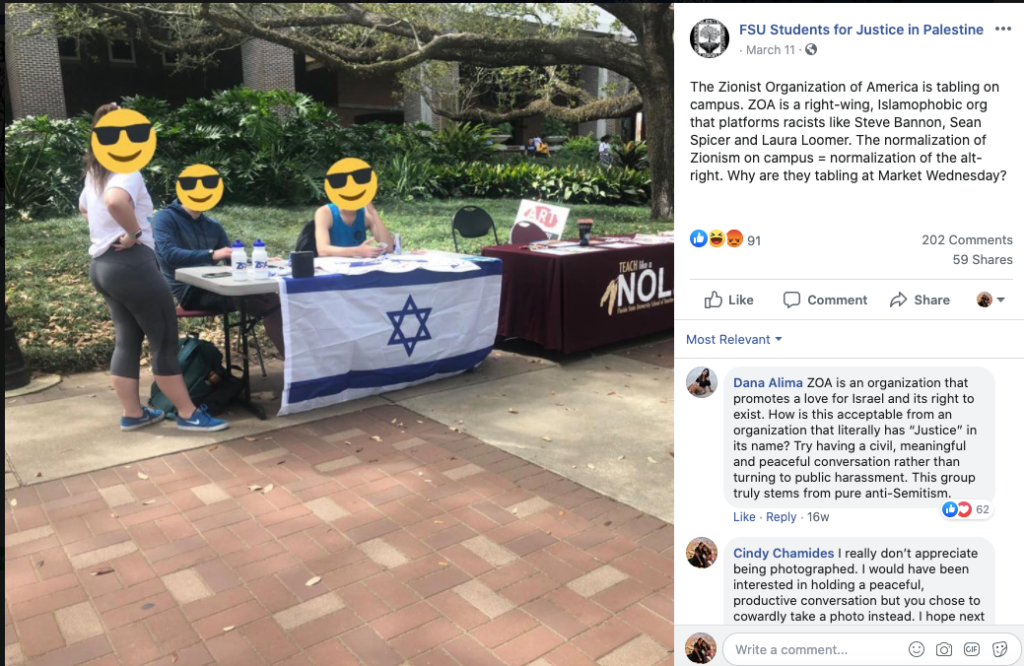
SJP consistently uses language like “From the river to the sea, Palestine will be free,” which calls for the annihilation of Israel and for all the Jews in the region to be pushed into the ocean, as well as invoking other tropes that imply real damage to our people. Swastikas have appeared on campus. This is in an environment in which hate crimes against Jews are on the rise. Sadly, FSU’s administration had no response to those events.
Unfortunately this was not the only instance of the type of bullying without consequences that Jewish and pro-Israel students face at FSU.
On June 5th, 2020, the Student Senate removed its previous president, Jack Denton, who was accused of making derogatory comments. They selected Ahmad Daraldik, a member of the FSU SJP, to take his place. Because of our history of experiencing bullying at the hands of SJP and their anti-normalization policy, I was concerned but open to giving President Daraldik a chance to lead without bias. Unfortunately, in the ensuing days, more and more evidence came to light about Daraldik’s antisemitic views and inability to lead impartially.
Dating as far back as 2012 and as recently as June 2020 (while already holding his position as Senate President), Daraldik has posted a flurry of antisemitic rhetoric online. These posts include a post on Instagram “stupid Jew thinks he is cool,” about a fake picture of an IDF soldier and “#f***Israel” and “#f***theoccupation.” He created a website which equates Israelis with Nazis. While some of these instances are older, Daraldik’s response in June was to defend his behavior and double down on his equation of Israelis with Nazis. Students, alumni, and fair-minded observers were incensed and called for his removal.
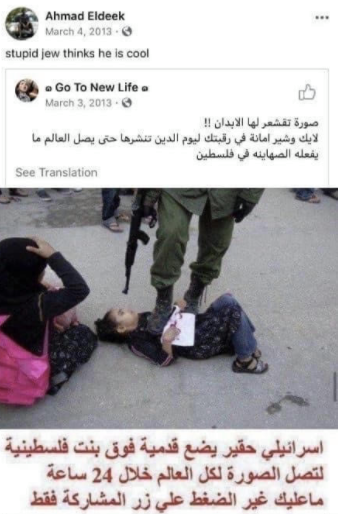
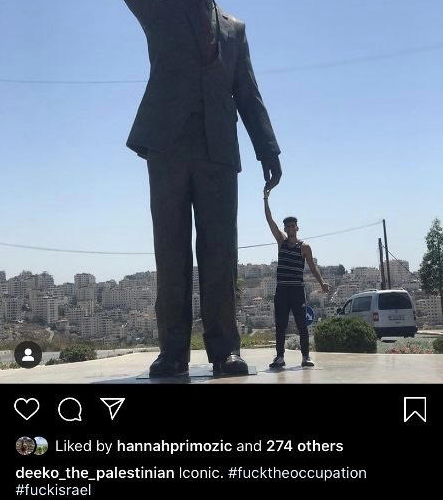
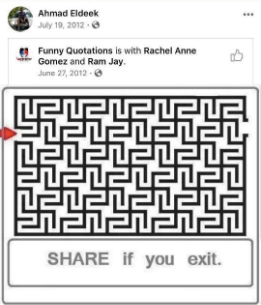
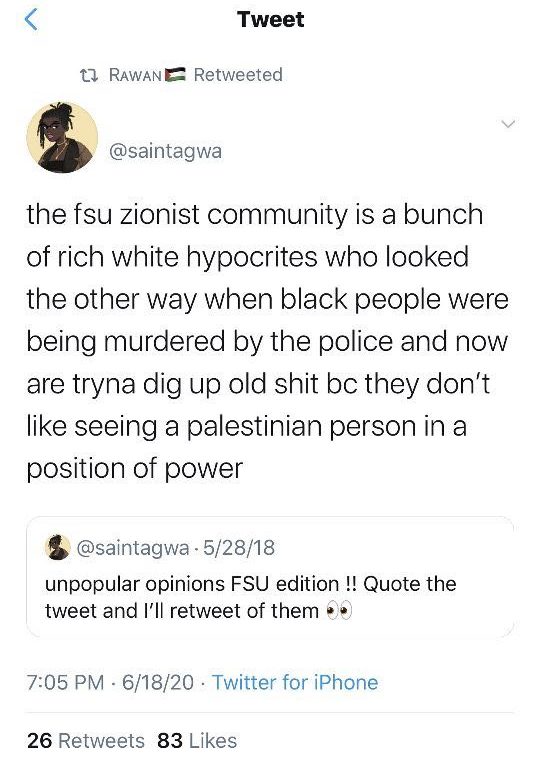
On June 18, 2020, Florida State University’s SGA Senate voted to keep Ahmad Daraldik in spite of the outcry from the Jewish community and its allies.
The FSU Senate had set a precedent just one meeting prior by removing Daraldik’s predecessor for expressing discriminatory views members of the FSU community found harmful. Individuals who condone or promote discrimination should not serve in leadership roles or represent the entirety of FSU’s student body. Daraldik was not held to that same standard of integrity.
Throughout the June 18th, 2020, meeting, Jewish students and their allies explained that while the documentation of Daraldik’s antisemitic comments goes as far back as social media posts from 2012, they were made as recently as June 2020, during his time as senate president.
Instead of apologizing for his antisemitic comments, Daraldik repeatedly justified his behavior by claiming ignorance and blaming his antisemitic posts on his youth and Israeli itself. He went as far as to defend a viciously antisemitic website he created, which compared Jews with their Nazi oppressors. While defending himself he tokenized a Jewish extremist, Norman Finkelstein, who has been widely condemned for promoting hate against the Jewish community. Still, the vote to uphold the standard that was set by the same senate nearly two weeks earlier had failed.
On June 29th, we became aware that Daraldik wrote an apology for antisemitic social media posts he made in 2012 and 2013. I accept his apology. However, I can’t help but wonder, why did it take more than three weeks for him to offer an apology? Moreover, Daraldik has yet to apologize for comparing the Jewish state to Nazis several times over the past couple of years and weeks and has failed to respond to the many FSU students who have reached out to him to express their concerns. The failure to remove Ahmad Daraldik exposed a broader problem on our campus: antisemitism is not taken seriously.
Despite this climate, the “Increasing Jewish Representation” Resolution passed on July 15th, 2020 in the student senate. This acts as only the first small step towards solving the antisemitism issue on my college campus. In addition, this resolution did not pass without attempts to discredit our community’s experience with antisemitism and obvious attempts to prevent the resolution from passing. While the passing of this resolution is a move in the right direction, it unfortunately does not fix the hurt in our community caused by Daraldik’s words or the ignorance of those student senators who tried to filibuster or amend the resolution.
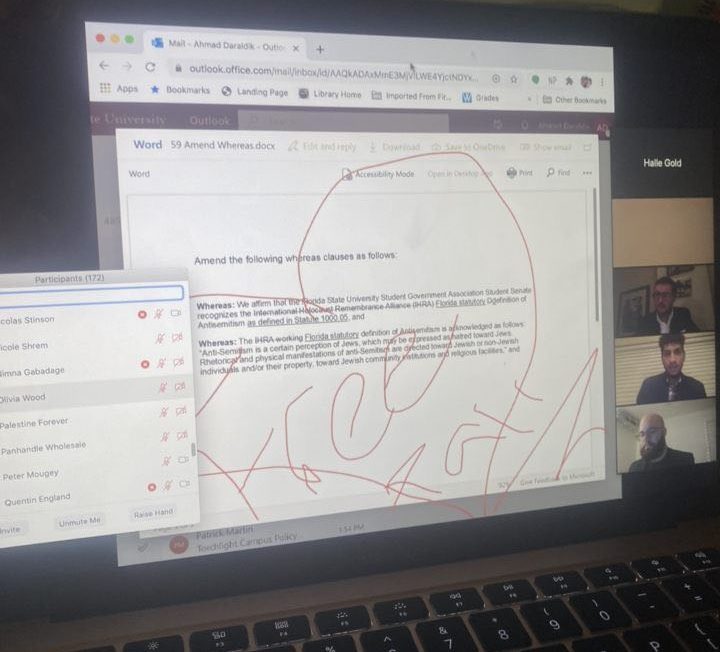
To this end, I pose a simple request to my fellow students. The next time a Jewish student expresses that something or someone is perpetuating antisemitism: pause, listen, and reflect. Antisemitism can occur in numerous forms, and has adapted to many different contexts over hundreds of years. If students are unsure about the different types of antisemitism, or how to combat it, they should take the steps to educate themselves and better our communities. All too often, I see charges of antisemitism reduced, defended, or brushed away. Moving forward, I simply ask that acts of antisemitism are held to the same standard as all other forms of bigotry: they are denounced and not tolerated under any circumstance.











